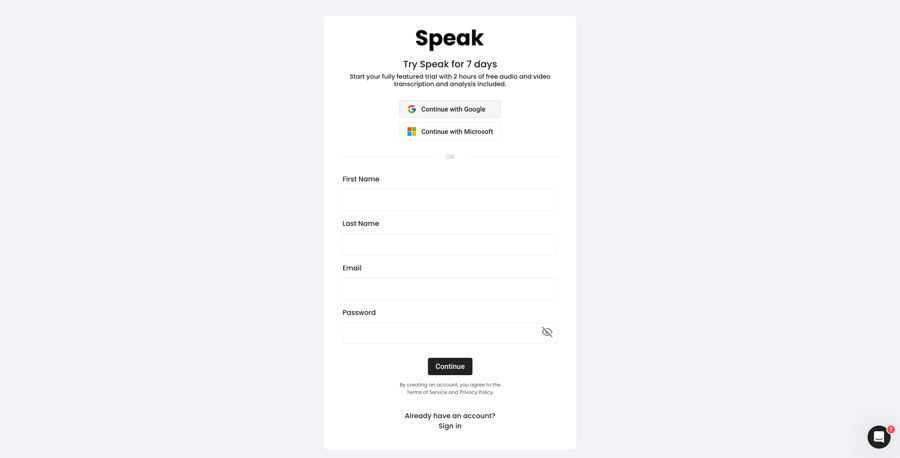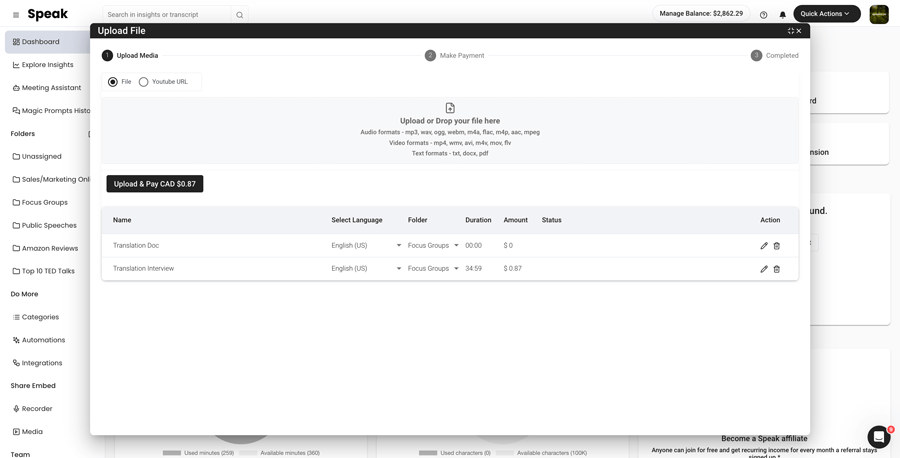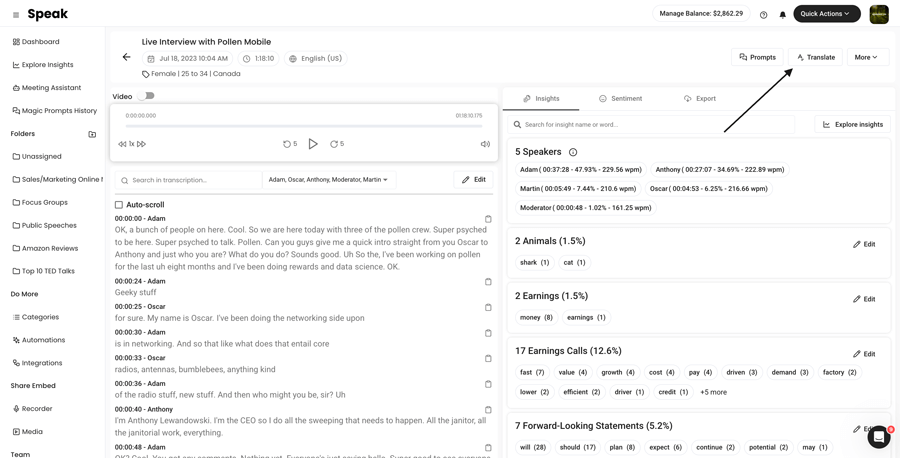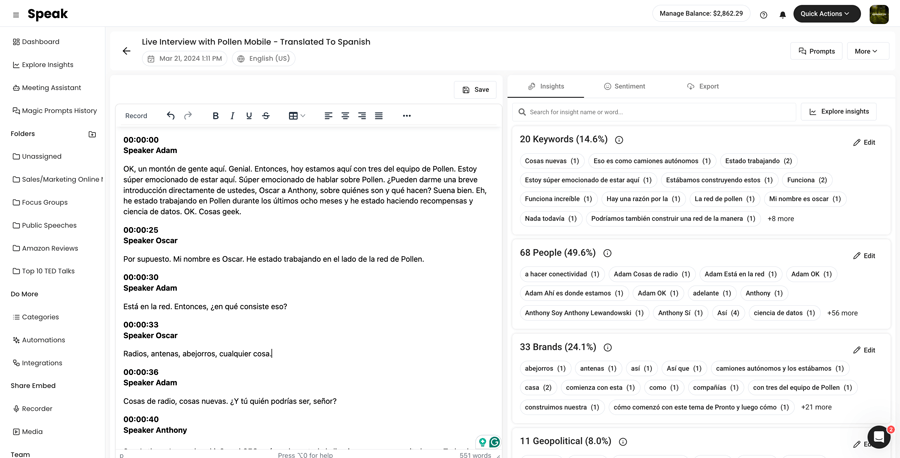How To Translate Japanese to Kazakh
Translating Japanese to Kazakh is super simple!

Step 1: Register for Speak
Register for Speak using this link.
Once you register, you can instantly begin translating your Japanese to Kazakh file(s).

Step 2: Upload Your Japanese file(s)
As soon as you log in, you will be redirected to the dashboard.
Once there, you can select the Quick Action "New Upload".
In Speak, you can seamlessly upload, transcribe and translate audio, video and text files all at once!

Step 3: Translate Your Japanese file(s) to Kazakh
Once the file is uploaded, simply visit your file and select "Translate".
If it is an audio and video file, Speak will ask you if you want to keep the speaker names and timestamps in the translation.
Want to translate many files at once? No problem!
You can view the files you want to automatically translate from Japanese to Kazakh from the folder level and instantly translate as many files as you need with our artificial intelligence translation in just a few clicks.

Step 4: That's It! View, Analyze, Modify & Export Your New Kazakh file(s)
Once the translation is done, you will be alerted and you will see a new document in the same folder your original file is in.
The file will be named the same but with a dash indicating that it is the translated version.
Need support with your Japanese translation?
We are always here and happy to help at Speak!
Just send us a message on live chat on the bottom right corner and we will ensure you are set up for success.
Interested in translating Japanese or other languages to different languages? View our entire list of supported translation languages here.
Automatic, accurate, instant AI translation from Japanese to Kazakh is here for you.
Register for Speak using this link and begin translating Japanese to Kazakh today.
Unlock the Potential: Translate Japanese to Kazakh with AI
In an era where borders are becoming increasingly blurry thanks to digital innovation, the need for seamless communication across different languages has never been more critical. Speak AI is at the forefront, leveraging NLP, large language models, and data visualization to bridge linguistic divides. This article explores the immense value and myriad benefits of translating Japanese to Kazakh, especially for researchers and businesses, through automatic translation tools like Speak Ai.
Why Japanese to Kazakh Translation Matters
Both Japanese and Kazakh play pivotal roles in their respective regions, influencing cultural, economic, and social dynamics. With Japan's formidable presence in technology, entertainment, and business intersecting with Kazakhstan's strategic location and economic prospects, the potential for synergistic collaborations is vast. However, language barriers often hinder such possibilities, underscoring the importance of effective translation solutions.
The Advantages of AI Translation Technologies
Speak Ai revolutionizes how we approach language translation, transcending traditional methods' limitations with its integrated NLP, generative AI, and data visualization capabilities.
Time and Cost Efficiency
Automating the Japanese to Kazakh translation process saves significant time and resources compared to manual translation, making communication swift and more accessible.
Accuracy and Contextual Awareness
Speak Ai’s translation tools are not just about word-for-word translation; they understand and adapt to context, nuances, and cultural specificity, ensuring a more accurate and relevant translation.
Scalability for Businesses and Researchers
Whether it's translating large volumes of documents or providing real-time translation during meetings via the AI Meeting Assistant, Speak Ai equips users to scale their operations without language barriers.
Exploring the Speak Ai Difference
With a 4.9 rating on G2 and over 150K users, Speak Ai's translation software has proven to be a reliable and innovative solution for various language translation needs, including Japanese to Kazakh.
Seamless Integration
Speak Ai seamlessly integrates with platforms like Microsoft Teams, Zoom, Google Meet, and Webex, providing real-time transcription and translation, thus enhancing collaboration across language divides.
Enhancing Research with AI
For researchers diving into linguistics or cultural studies, Speak Ai's tools offer an unparalleled resource for translating and analyzing content, aiding in the exploration of Japanese and Kazakh texts.
Japanese and Kazakh: A World Apart Yet Connected
Geographical and Cultural Significance
Japan, an island nation in East Asia, is known for its rich culture, technological advancements, and influential entertainment industry. Kazakhstan, situated in Central Asia, is world-renowned for its vast landscapes, mineral resources, and strategic economic position.
Language: Bridging Two Rich Cultures
While Japanese and Kazakh come from different language families, the movement to translate between these languages grows as businesses and cultural exchanges flourish, showcasing the deepening connections across continents.
Fascinating Insights into Japanese and Kazakh
Interesting Stats and Historical Context
Japanese is spoken by over 128 million people predominantly in Japan. Kazakh is the state language of Kazakhstan, with around 13 million speakers. The historical paths of these languages reflect diverse cultural narratives and evolutionary trajectories.
Fun Facts About Japanese and Kazakh
Did you know that Japanese has thousands of characters (Kanji), while Kazakh was traditionally written in Arabic, switched to Cyrillic, and is now transitioning to the Latin alphabet? This showcases the dynamic nature of language evolution.
Understanding the Nuances: Japanese vs. Kazakh
Similarities and Differences
Japanese and Kazakh might seem worlds apart, with distinct alphabets, phonetics, and grammar systems. However, their importance as carriers of culture, history, and identity unites them. Both languages face modern challenges, including the preservation of linguistic heritage in the digital age and ensuring accurate translations that reflect their rich cultural nuances.
The Power of Translation
The journey from Japanese to Kazakh, facilitated by advanced AI translation tools like Speak Ai, is more than conveying words; it's about exchanging ideas, traditions, and perspectives, fostering a deeper understanding and appreciation of our diverse world.
Final Thoughts
Translating Japanese to Kazakh is not merely about overcoming linguistic barriers; it's an investment in building bridges between two unique cultures. With tools like Speak Ai, businesses and researchers can unlock untapped potential, ushering in a new era of collaboration and innovation. Embrace the power of translation and let language be your ally, not an obstacle.
By adopting Speak Ai's advanced translation solutions, you're not just staying ahead of the curve; you're reshaping the future of cross-cultural communication. Dive into the world of seamless Japanese to Kazakh translation and discover a realm of possibilities waiting to be explored.
Remember, in the vast expanse of human expression, every translation is a step towards a more connected, understanding world. Join Speak Ai in this transformative journey and redefine the boundaries of what’s possible when languages unite.
Translate Japanese To These Other Supported Languages:
- Translate Japanese-to-Albanian
- Translate Japanese-to-Amharic
- Translate Japanese-to-Arabic (Egypt)
- Translate Japanese-to-Arabic (Iraq)
- Translate Japanese-to-Arabic (Israel)
- Translate Japanese-to-Arabic (Jordan)
- Translate Japanese-to-Arabic (Kuwait)
- Translate Japanese-to-Arabic (Lebanon)
- Translate Japanese-to-Arabic (Oman)
- Translate Japanese-to-Arabic (Palestinian Authority)
- Translate Japanese-to-Arabic (Qatar)
- Translate Japanese-to-Arabic (Saudi Arabia)
- Translate Japanese-to-Arabic (Syrian Arab Republic)
- Translate Japanese-to-Arabic (United Arab Emirates)
- Translate Japanese-to-Arabic Modern Standard (Bahrain)
- Translate Japanese-to-Armenian
- Translate Japanese-to-Azerbaijani
- Translate Japanese-to-Bengali
- Translate Japanese-to-Bosnian
- Translate Japanese-to-Bulgarian
- Translate Japanese-to-Catalan
- Translate Japanese-to-Chinese (Cantonese, Traditional)
- Translate Japanese-to-Chinese (Simplified)
- Translate Japanese-to-Chinese (Traditional)
- Translate Japanese-to-Croatian
- Translate Japanese-to-Czech
- Translate Japanese-to-Danish
- Translate Japanese-to-Dari
- Translate Japanese-to-Dutch
- Translate Japanese-to-English
- Translate Japanese-to-English (Australia)
- Translate Japanese-to-English (India)
- Translate Japanese-to-English (Ireland)
- Translate Japanese-to-English (New Zealand)
- Translate Japanese-to-English (Scottish)
- Translate Japanese-to-English (South African)
- Translate Japanese-to-English (United Kingdom)
- Translate Japanese-to-English (United States)
- Translate Japanese-to-Estonian
- Translate Japanese-to-Farsi (Persian)
- Translate Japanese-to-Finnish
- Translate Japanese-to-French
- Translate Japanese-to-French (Canada)
- Translate Japanese-to-Georgian
- Translate Japanese-to-German
- Translate Japanese-to-German (Swiss)
- Translate Japanese-to-Greek
- Translate Japanese-to-Gujarati
- Translate Japanese-to-Haitian Creole
- Translate Japanese-to-Hausa
- Translate Japanese-to-Hebrew
- Translate Japanese-to-Hindi
- Translate Japanese-to-Hungarian
- Translate Japanese-to-Icelandic
- Translate Japanese-to-Indonesian
- Translate Japanese-to-Irish
- Translate Japanese-to-Italian
- Translate Japanese-to-Japanese
- Translate Japanese-to-Kannada
- Translate Japanese-to-Kazakh
- Translate Japanese-to-Korean
- Translate Japanese-to-Latvian
- Translate Japanese-to-Lithuanian
- Translate Japanese-to-Macedonian
- Translate Japanese-to-Malay
- Translate Japanese-to-Malayalam
- Translate Japanese-to-Maltese
- Translate Japanese-to-Marathi
- Translate Japanese-to-Mongolian
- Translate Japanese-to-Norwegian
- Translate Japanese-to-Pashto
- Translate Japanese-to-Persian
- Translate Japanese-to-Polish
- Translate Japanese-to-Portuguese
- Translate Japanese-to-Portuguese (Brazilian)
- Translate Japanese-to-Portuguese (Portugal)
- Translate Japanese-to-Punjabi
- Translate Japanese-to-Romanian
- Translate Japanese-to-Russian
- Translate Japanese-to-Serbian
- Translate Japanese-to-Sinhala
- Translate Japanese-to-Slovak
- Translate Japanese-to-Slovenian
- Translate Japanese-to-Somali
- Translate Japanese-to-Spanish
- Translate Japanese-to-Spanish (Mexico)
- Translate Japanese-to-Swahili
- Translate Japanese-to-Swedish
- Translate Japanese-to-Tamil
- Translate Japanese-to-Telugu
- Translate Japanese-to-Thai
- Translate Japanese-to-Turkish
- Translate Japanese-to-Ukrainian
- Translate Japanese-to-Urdu
- Translate Japanese-to-Uzbek
- Translate Japanese-to-Vietnamese
- Translate Japanese-to-Welsh



